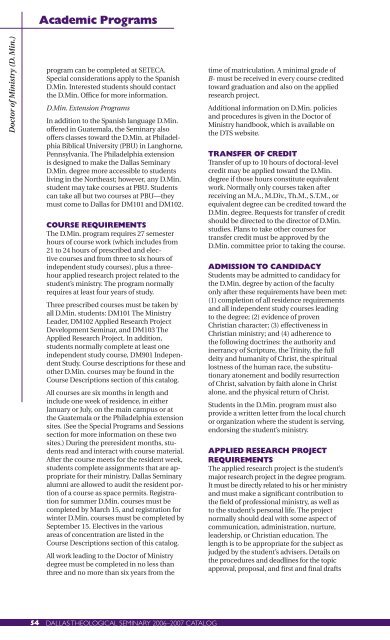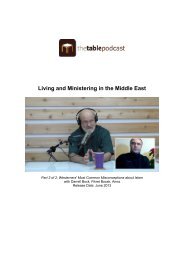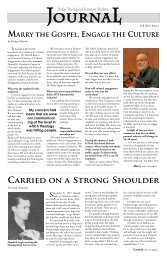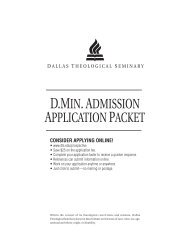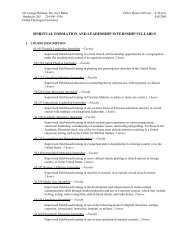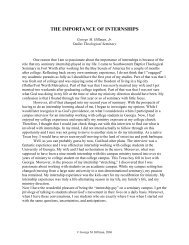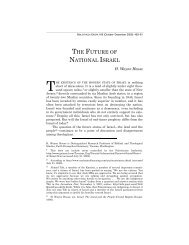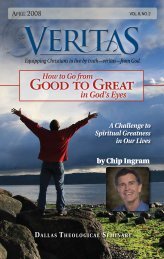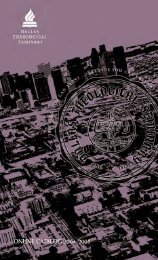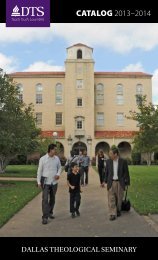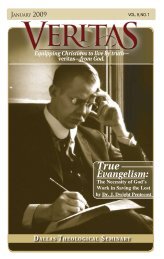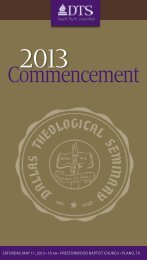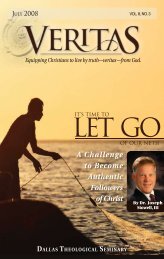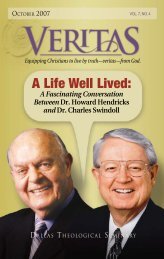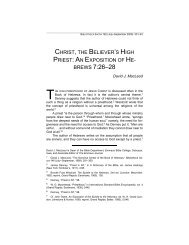Academic Programs - Dallas Theological Seminary
Academic Programs - Dallas Theological Seminary
Academic Programs - Dallas Theological Seminary
Create successful ePaper yourself
Turn your PDF publications into a flip-book with our unique Google optimized e-Paper software.
<strong>Academic</strong> <strong>Programs</strong><br />
Doctor of Ministry (D. Min.)<br />
program can be completed at SETECA.<br />
Special considerations apply to the Spanish<br />
D.Min. Interested students should contact<br />
the D.Min. Office for more information.<br />
D.Min. Extension <strong>Programs</strong><br />
In addition to the Spanish language D.Min.<br />
offered in Guatemala, the <strong>Seminary</strong> also<br />
offers classes toward the D.Min. at Philadelphia<br />
Biblical University (PBU) in Langhorne,<br />
Pennsylvania. The Philadelphia extension<br />
is designed to make the <strong>Dallas</strong> <strong>Seminary</strong><br />
D.Min. degree more accessible to students<br />
living in the Northeast; however, any D.Min.<br />
student may take courses at PBU. Students<br />
can take all but two courses at PBU—they<br />
must come to <strong>Dallas</strong> for DM101 and DM102.<br />
COURSE REQUIREMENTS<br />
The D.Min. program requires 27 semester<br />
hours of course work (which includes from<br />
21 to 24 hours of prescribed and elective<br />
courses and from three to six hours of<br />
independent study courses), plus a threehour<br />
applied research project related to the<br />
student’s ministry. The program normally<br />
requires at least four years of study.<br />
Three prescribed courses must be taken by<br />
all D.Min. students: DM101 The Ministry<br />
Leader, DM102 Applied Research Project<br />
Development Seminar, and DM103 The<br />
Applied Research Project. In addition,<br />
students normally complete at least one<br />
independent study course, DM901 Independent<br />
Study. Course descriptions for these and<br />
other D.Min. courses may be found in the<br />
Course Descriptions section of this catalog.<br />
All courses are six months in length and<br />
include one week of residence, in either<br />
January or July, on the main campus or at<br />
the Guatemala or the Philadelphia extension<br />
sites. (See the Special <strong>Programs</strong> and Sessions<br />
section for more information on these two<br />
sites.) During the preresident months, students<br />
read and interact with course material.<br />
After the course meets for the resident week,<br />
students complete assignments that are appropriate<br />
for their ministry. <strong>Dallas</strong> <strong>Seminary</strong><br />
alumni are allowed to audit the resident portion<br />
of a course as space permits. Registration<br />
for summer D.Min. courses must be<br />
completed by March 15, and registration for<br />
winter D.Min. courses must be completed by<br />
September 15. Electives in the various<br />
areas of concentration are listed in the<br />
Course Descriptions section of this catalog.<br />
All work leading to the Doctor of Ministry<br />
degree must be completed in no less than<br />
three and no more than six years from the<br />
time of matriculation. A minimal grade of<br />
B- must be received in every course credited<br />
toward graduation and also on the applied<br />
research project.<br />
Additional information on D.Min. policies<br />
and procedures is given in the Doctor of<br />
Ministry handbook, which is available on<br />
the DTS website.<br />
TRANSFER OF CREDIT<br />
Transfer of up to 10 hours of doctoral-level<br />
credit may be applied toward the D.Min.<br />
degree if those hours constitute equivalent<br />
work. Normally only courses taken after<br />
receiving an M.A., M.Div., Th.M., S.T.M., or<br />
equivalent degree can be credited toward the<br />
D.Min. degree. Requests for transfer of credit<br />
should be directed to the director of D.Min.<br />
studies. Plans to take other courses for<br />
transfer credit must be approved by the<br />
D.Min. committee prior to taking the course.<br />
ADMISSION TO CANDIDACY<br />
Students may be admitted to candidacy for<br />
the D.Min. degree by action of the faculty<br />
only after these requirements have been met:<br />
(1) completion of all residence requirements<br />
and all independent study courses leading<br />
to the degree; (2) evidence of proven<br />
Christian character; (3) effectiveness in<br />
Christian ministry; and (4) adherence to<br />
the following doctrines: the authority and<br />
inerrancy of Scripture, the Trinity, the full<br />
deity and humanity of Christ, the spiritual<br />
lostness of the human race, the substitutionary<br />
atonement and bodily resurrection<br />
of Christ, salvation by faith alone in Christ<br />
alone, and the physical return of Christ.<br />
Students in the D.Min. program must also<br />
provide a written letter from the local church<br />
or organization where the student is serving,<br />
endorsing the student’s ministry.<br />
APPLIED RESEARCH PROJECT<br />
REQUIREMENTS<br />
The applied research project is the student’s<br />
major research project in the degree program.<br />
It must be directly related to his or her ministry<br />
and must make a significant contribution to<br />
the field of professional ministry, as well as<br />
to the student’s personal life. The project<br />
normally should deal with some aspect of<br />
communication, administration, nurture,<br />
leadership, or Christian education. The<br />
length is to be appropriate for the subject as<br />
judged by the student’s advisers. Details on<br />
the procedures and deadlines for the topic<br />
approval, proposal, and first and final drafts<br />
54<br />
DALLAS THEOLOGICAL SEMINARY 2006–2007 CATALOG


